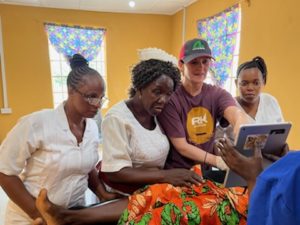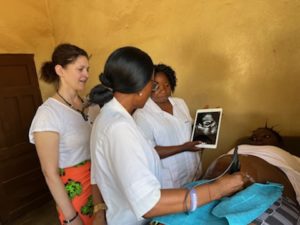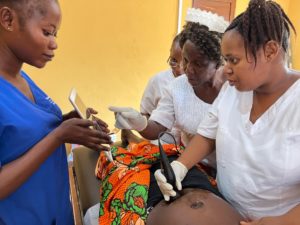NEW TECHNOLOGY, TRAINING MEANS HEALTHIER MOTHERS AND BABIES IN SIERRA LEONE
In the US, an ultrasound has become a routine and highly anticipated ritual of pregnancy. It allows a mother-to-be and her partner—and sometimes their circle of family and fiends—to get a sneak peek of the developing baby.

Left to right: Juliana Sagba (RHCI head nurse at Mbao-mi Mothers’ Home), Aminata Kallon (Midwife at Tikonko Community Health Center, Ultrasound trainer Inna Gabrielson, and Isata Bah (Nurse at Mbao-mi Mothers’ Home).
But this wondrous window into the womb does more than build the bond between the parents and the still-forming child.
For medical providers, ultrasound offers vital, valuable information by providing images that can improve the odds of achieving a healthy pregnancy and a safe delivery. In rural Sierra Leone, there has been no access to this medical testing. Mothers-to-be and their health care teams have not experienced the benefits of ultrasound, which offers information
about fetal growth, the placement of the placenta and whether the baby is breech or if the woman is carrying multiples.
Thanks to Rural Health Care Initiative (RHCI) and a group of committed medical professionals and volunteers, this technology arrived earlier this spring in Sierra Leone. It’s particularly welcome, since the West African nation has long held one of the world’s highest maternal and infant death rates.
The much celebrated arrival of portable IQ Butterfly Ultrasound followed several years of collaboration between maternal health professionals in Minnesota and in-country RHCI staff in Sierra Leone. The device was first identified as the superior option by RHCI Board Member Dr. Beth Detlie.
In Tikonko and Gondama, three midwives (Aminata Kallon, Aminata Kabba and Margaret Sylvalie) and two nurses (Juliana Sagba and Isata Bah) logged on to learn the basics through a Basic OB Ultrasound course. Over Zoom, the Sierra Leone team got expert training from skilled ultrasonographers from Rayus Radiology in Minnesota—Inna Gabrielson and Rachel Skinnert volunteered their time.

Left to Right: Ultrasound trainer Inna Gabrielson, Aminata Kabba (Midwife at Gondama CHC) and Margaret Sylvalie (Midwife at Gondama CHC and BWH)
That training met real life in March, when Inna joined other Minnesota volunteers in a two week visit to Sierra Leone. The obstetrical ultrasound training became hands-on as she worked side-by-side with the staff at the RHCI Birth Waiting Homes and at the Gondama and Tikonko Community Health Centers.
The trainees enthusiastically embraced the new skills, learning how to date a pregnancy, determine position or presentation of the baby and gauge the amount of amniotic fluid. Such ultrasound information improves the quality of care for both mother and baby, alerting providers to nuances in the pregnancy and helping to determine if the mother should be
transferred to the district hospital for delivery.
RHCI is grateful to the generous support of many donors who made this new technology available for women in rural Sierra Leone. Ultrasound is one part of RHCI’s “system of care” that is reducing maternal and newborn mortality for families there.

Left to Right: Marie Songa (nurse at Mbao-mi Mothers’ Home), Juliana Sagba (head nurse Mbao-mi), Aminata Kallon (Midwife at Tikonko CHC) and Isata Bah (nurse at Mbao-mi Mothers’ Home)
